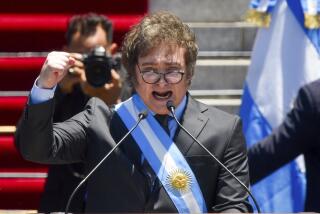Berlusconi Tapped as Italy Premier : Politics: He accepts offer to form government out of winning coalition. Meanwhile, first sentence in national corruption probe is handed down.
- Share via
ROME — Propelled to power by a voter revolt against corruption, political newcomer Silvio Berlusconi became prime minister-designate of Italy on Thursday, promising to build a strong government on free-market economics, administrative efficiency and the renewal of public morality.
A 57-year-old self-made billionaire, Berlusconi accepted President Oscar Luigi Scalfaro’s long-awaited offer to form a government on the basis of a three-party conservative alliance that won national elections last month. Publicly accepting the appointment, Berlusconi stressed the need to restore the confidence of Italians in their government after an unprecedented bout of political corruption.
As Berlusconi spoke, Milanese magistrates were passing sentence against businessman Sergio Cuscani, accused of engineering huge bribes and payoffs for Italy’s major chemical company.
Cuscani, the first judicial victim among about 3,000 businessmen and politicians implicated in systematic bribery and kickbacks between business and political parties, was sentenced Thursday night to eight years.
As for Berlusconi, he promised a transparent government of officials “who are above reproach” and added: “I will do my best to create a government that is not taken up with old political games and petty favor-mongering.”
Berlusconi said he will begin a round of consultations with economic and political leaders on Monday. Analysts expect it may take until mid-May before he is ready to launch his government with a confirming vote in Parliament.
“We will seek a climate of confidence for both business and for labor,” Berlusconi told reporters after an hour’s meeting with Scalfaro at the Quirinale Palace in the shank of a lovely spring afternoon.
Berlusconi promises the first unabashedly free-market government in Italy since World War II. Outlining his policies to reporters on Thursday, the Milan entrepreneur promised economic renewal through new investment, more jobs, reduced government spending and debt and tax reform. He pledged intensified efforts against organized crime.
*
Italy, he said, “is one and indivisible.” His government, Berlusconi promised, will reject “extremisms and fanaticisms.” The remark was clearly intended to allay nervousness many Italians share about his election partners: a neo-fascist party and one that demands a federalist state with reduced central government authority.
“A modern state must be less interfering but more efficient,” Berlusconi said. “Political parties must take a step back, and public institutions must reassume their role as the fulcrum of government activity.”
To make Italy’s flagging social services function as well as those administered by its European Union partners, Berlusconi said they must run “at compatible costs in a market economy with a systematic and stern fight against waste.”
Opponents and allies alike worry that Berlusconi’s business and media empire would profit from his government role. He ruled out possible sale of his television holdings but told reporters that three guarantors would be named to ensure there would be no conflict of interest between his financial empire and his duties as prime minister.
Berlusconi is sole owner of enterprises that did $7 billion worth of business last year. He owns real estate, a supermarket chain, Italy’s largest advertising agency, movie houses, a film production company, and Milan, Italy’s champion soccer team. He owns a national news weekly magazine, and, through his brother Paolo, a Milan newspaper.
Only in January did Berlusconi decide to personally lead his new Forza Italia (Go, Italy) party to the polls in his political debut. In three months, he rocketed from prime mogul to prime minister.
*
Such a meteoric rise, unprecedented in Italian politics, was a function of Berlusconi’s free-spending organization and his control of a large chunk of the Italian media.
But what made it fundamentally possible was the revulsion Italian voters had developed for parties too long in power and riddled with corruption.
The Christian Democrats, who dominated every one of Italy’s 52 postwar governments, are now reduced to small, scattered splinters, most in the opposition. Berlusconi, a virulent anti-Communist, says he entered politics to short-circuit a likely election victory of a left-wing alliance led by the former Italian Communist Party. The former Communists now lead the opposition in Parliament.
For the election, Berlusconi teamed with the neo-fascist National Alliance led by Gianfranco Fini, and with the Northern League, headed by federalist Sen. Umberto Bossi, who hates the fiddling Roman bureaucracy and sometimes talks of secession for the rich north.
Now that he has officially been given the portfolio, it will be up to Berlusconi to hammer out the formation of a Cabinet and a program.
More to Read
Sign up for Essential California
The most important California stories and recommendations in your inbox every morning.
You may occasionally receive promotional content from the Los Angeles Times.










